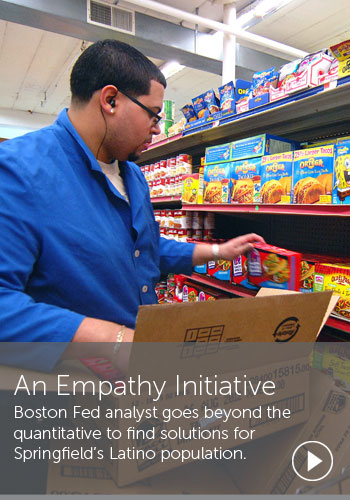An Empathy Initiative
Boston Fed analyst goes beyond the quantitative to find solutions for Springfield's Latino population.
Beyond the Fed’s sophisticated and effective use of data and analysis to solve economic problems, sometimes a researcher’s personal empathy and connection with a community can be her greatest asset, enabling her to frame data in such a way that she can get to the heart of an economic problem. Ana Patricia Muñoz, Senior Policy Analyst, discovered just that in the large Latino community of Springfield, Massachusetts.
“I love economics—that’s my background,” said Muñoz, “but I’d always been especially interested in development economics and issues that affect lower-income communities.” Beginning her Boston Fed career as a Research Assistant, she was thrilled to have the opportunity to join the Bank’s initiative “Toward a More Prosperous Springfield,” which supports ongoing efforts to revitalize the city of Springfield.
With the oversight of colleague Yolanda Kodrzycki, Muñoz compared Springfield with other small industrial cities across the nation. She found that, despite having considerable assets—hospitals, institutes of higher education, and several key employers—Springfield seemed stalled on the threshold of recovery.
What was curbing the city’s progress? The city’s jobs picture held some clues. Springfield’s workforce participation is very low: in some neighborhoods, less than half the working-age population hold a job or are seeking employment, compared with more than 67 percent statewide. The city doesn’t lack employers, and the number of available jobs is similar to that found in its peer cities, but many Springfield residents are unable to connect with those positions.
The fact that this disconnect greatly affects Springfield’s Latino population is evident in the city’s poverty and unemployment data. Springfield’s population is 38 percent Latino, and in some neighborhoods, especially the North End, the Latino population is higher than 80 percent. In those neighborhoods, the poverty and unemployment rates are even higher. If the disconnect between employer and unemployed cannot be easily resolved, is there a solution for Springfield’s struggling neighborhoods?
During visits to the city, several Boston Fed staff members noticed a surprising dearth of small businesses in the city’s neighborhoods. This observation pushed Muñoz toward her hypothesis that promoting self-employment, small-business development, and entrepreneurship among Latino residents would not only provide jobs to lower-income residents but also help revitalize the city.
Back in the office, Muñoz began a literature review on the topic of whether self-employment would benefit Springfield’s jobless residents. “Like all research,” she says, “it gave mixed results.” Few authors looked specifically at the role of entrepreneurship in the Latino population, but some did report signs that looked encouraging. “For low-educated males, the literature showed that they were better off being self-employed,” says Muñoz, “and for the demographics we’re talking about in Springfield, that could be a good option.”
With that encouraging finding, Muñoz felt confident moving ahead. As with anyone trained in economics, she had turned to the data for answers, but the available data had provided only clues and partial answers. For example, the data gave the number of Latino businesses but did not indicate why those businesses were started or what challenges they faced.
The data did tell Muñoz how important self-employment was to the Latino community. “This is an important sector, and the city should pay more attention to it,” says Muñoz.
Determined to prove her hypothesis, Muñoz went back to Springfield. There she interviewed ten Latino small-business owners in predominantly Latino neighborhoods. She was armed with her theories and questions, but her greatest asset may have been her empathy. Like many of the entrepreneurs with whom Muñoz spoke, she herself speaks Spanish as a first language, grew up outside the United States, and immigrated here seeking better opportunities. Because she conducted her interviews in Spanish, most sessions went far beyond her initial questionnaire.
“This wasn’t a questionnaire, it was a conversation,” said Muñoz. “It’s always a good thing to speak the language of the people being interviewed because they can communicate better.” Interviewees spoke about how they began their businesses—with their own money rather than with loans—and emphasized their roots in their neighborhood and families and shared their personal stories with Muñoz.
Muñoz found that a small-business owner’s role in the community goes beyond economic impact. The entrepreneurs in the Latino community provided many uncompensated services such as translation, tax preparation assistance, support completing forms, and help with job searches.
While they regularly make their services available to their community, most small-business owners were unaware of city services that were available to them. “If those programs are not in the community,” says Muñoz, “they won’t work.” For most small-business owners, availing themselves of city services boils down to an issue of trust. “They need someone who knows the community and works in the community and knows their needs.”
Building that trust takes time and understanding. Prabal Chakrabarti, Vice President of Regional and Community Outreach at the Boston Fed, sees Muñoz’s success in engaging the small-business owners as demonstrating that: “She wouldn’t have gotten these businesspeople to talk to her if she hadn’t been speaking their language and being who she was,” said Chakrabarti, reflecting on Muñoz’s work. “Part of our mandate is economic growth, and we need to make sure there’s economic growth for everybody.”
